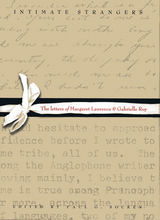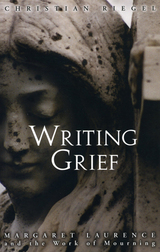3 books about Margaret Laurence

Alien Heart
The Life and Work of Margaret Laurence
Lyall Powers
University of Manitoba Press, 2005
Today, almost two decades after her death, Margaret Laurence remains one of Canada's best-known and most beloved writers. Twice winner of the Governor General's Award for fiction, she was, as the late William French wrote, "more profoundly admired than any other Canadian novelist of her generation."
Lyall Powers is both a respected scholar of literature and a lifelong friend of Laurence's, having met her when they were students together at Winnipeg's United College in the 1940s. Alien Heart is the first full-length biography of Margaret that combines personal knowledge and insights about Laurence with a study of her work, which often paralleled the events and concerns in her own life.
Drawing on letters, personal correspondence, journals, and interviews, Lyall Powers discusses the struggles and triumphs Laurence experienced in her efforts to understand herself in the roles of writer, wife, mother, and public figure. He portrays a deeply compassionate and courageous woman, who yet felt troubled by conflicting demands. While Laurence's work is not directly autobiographical, Powers illustrates how her writing expressed many of the same dilemmas, and how the resolution her characters achieved in the novels and stories had an impact on Laurence's own life.
Powers provides an in-depth analysis of all Laurence's work, including the early African essays, fiction, and translations, and her books for children, as well as the beloved Manawaka fiction. The study clearly shows the progression and expression of Laurence as a writer of great humanity and conscience.
Lyall Powers is both a respected scholar of literature and a lifelong friend of Laurence's, having met her when they were students together at Winnipeg's United College in the 1940s. Alien Heart is the first full-length biography of Margaret that combines personal knowledge and insights about Laurence with a study of her work, which often paralleled the events and concerns in her own life.
Drawing on letters, personal correspondence, journals, and interviews, Lyall Powers discusses the struggles and triumphs Laurence experienced in her efforts to understand herself in the roles of writer, wife, mother, and public figure. He portrays a deeply compassionate and courageous woman, who yet felt troubled by conflicting demands. While Laurence's work is not directly autobiographical, Powers illustrates how her writing expressed many of the same dilemmas, and how the resolution her characters achieved in the novels and stories had an impact on Laurence's own life.
Powers provides an in-depth analysis of all Laurence's work, including the early African essays, fiction, and translations, and her books for children, as well as the beloved Manawaka fiction. The study clearly shows the progression and expression of Laurence as a writer of great humanity and conscience.
[more]

Intimate Strangers
The Letters of Margaret Laurence and Gabrielle Roy
Margaret Laurence
University of Manitoba Press, 2004
The books of Margaret Laurence and Gabrielle Roy are among the most beloved in Canadian literature. In 1976, when both were at the height of their careers, they began a seven-year written correspondence. Laurence had just published her widely acclaimed The Diviners, for which she won her second Governor-General’s Award, and Roy had returned to the centre of the literary stage with a series of books that many critics now consider her richest and most mature works. Although both women had been born and raised in Manitoba — Laurence in Neepawa and Roy in St. Boniface — they met only once, in 1978 at a conference in Calgary. As these letters reveal, their prairie background created a common understanding of place and culture that bridged the differences of age and language. Here Laurence and Roy discuss everything from their own and each other’s writing, to Canadian politics, housekeeping, publishing, and their love of nature. With a thoughtful introduction by Paul G. Socken, these lovely and intimate letters record the moving, affectionate friendship between two remarkable women.
[more]

Writing Grief
Margaret Laurence and the Work of Mourning
Christian Riegel
University of Manitoba Press, 2003
Margaret Laurence's much admired Manawaka fiction - The Stone Angel, A Jest of God, The Fire-Dwellers, A Bird in the House, and The Diviners – has achieved remarkable recognition for its compassionate portrayal of the attempt to find meaning and peace in ordinary life. In Writing Grief, Christian Riegel argues that the protagonists in these books achieve resolution through acts of mourning, placing this fiction within the larger tradition of writing that explores the nuances and strategies of mourning.
Riegel's analysis alludes to sociological and literary antecedants of the study of mourning, including the tradition of elegy, from Derrida and Lacan to Freud, van Gennep, and Milton. The "work" of mourning is necessary to move from a state of emotional paralysis to one of acceptance and active engagement. Laurence's characters "perform the work of mourning ... returning over and over again to the key issues relating to loss," and, as Riegel's close examination of the texts suggests, are changed thereafter fundamentally and significantly.
As an important study of one aspect of Laurence's oeuvre, Writing Grief not only illustrates how Laurence's own preoccupations with mourning are figured, but also how different ways of working through grief result in renewed potential for consolation and connection, and "a renewed definition of self."
[more]
READERS
Browse our collection.
PUBLISHERS
See BiblioVault's publisher services.
STUDENT SERVICES
Files for college accessibility offices.
UChicago Accessibility Resources
home | accessibility | search | about | contact us
BiblioVault ® 2001 - 2024
The University of Chicago Press









